We had a busy Council day on Monday, and a lot of great work got done, some of it even before it got too late. There was enough there that I will probably do two posts, the first half covering the part of the Agenda that is city business, and I’ll get to the Motions from Council in a follow up after I have time to write some more extended thoughts ab0ut them. First the scheduled business of the night that started with a couple of Reports:
Massey Theatre Renovation – Scope, Schedule and Budget
When the City agreed back in 2015 to take over the Massey Theatre from the School District and protect it from demolition, there was some recognition that there would be costs to bringing the old building up to acceptable standards for long-term use. This means addressing long-neglected maintenance (that’s not a criticism, the School District was not planning to keep the building so why spend money maintaining what you are about to tear down?) and necessary upgrades to the function of the building and seismic safety. By 2019, City staff had estimated the cost of needed repair at about $22M – this for a “Minimum Viable Option” – not a bunch of nice-to-haves, but basic required work to keep the building safe and operational for another 25 years.
That number has bounced around a bit over subsequent budgets, both as scope changes happen, and as the City finally took over the building in late 2021, and were able to start doing detailed analyses of the building systems (it didn’t help that the School District reneged on their promise to contribute $1.2M to the cost of demolition of the old gym side of the complex). The current capital budget (approved this spring) has $14.1M earmarked for Massey upgrades. Staff are now asking us to increase this amount to $20.1M, both to address the critical building systems that we already agreed were needed, but also to do more intensive roof and envelope work, and to make important accessibility upgrades so the full building will be (for the first time!) accessible to people with mobility barriers.
There are two strategies to fund this increase. We can take it from the $15.6M in Building Communities Fund money we received from the Province this year. Alternately we could defer some of the other items in our 5-year Capital budget and staff have provided us a list of things that might be deferred to make up all of part of the $6 Million (road works, street lights, etc.). We could then apply the BCF money to those things we deferred, I suppose, so this is all a bit academic, but the simplest and most predictable path is for us to use the BCF funds directly. Most importantly, we are making the commitment now so that Massey Theatre Society knows the timelines and path for our work to get done so they can proactively plan around the unfortunate but necessary disruptions to their programming while the work gets done.
This is a really good news story for Arts in the community.
2023 Capital and Operating Quarterly Performance Report
This is our new practice of Quarterly budget updates. The proposal is to add $6M to our Capital budget to reflect the Massey Theatre budget change. There are a few other adjustments of the Capital Budget, but the over-budget parts are offset by savings on other projects. On the operating side, we are a bit ahead of budget on revenues and a bit down on expenditures, putting us about $2M “in the black” above of our projected balance at this point in the budget year, but it is early in the year, and let’s not get too excited just yet!
We then moved the following items On Consent:
327 Louellen Street: Sale of Abutting City Property
Some home lots in New West have back alleys, some don’t. In some places the City owns portions of what could be an alley right-of-way, but either the City property is not contiguous to provide an alley, or the City has decided that an alley is not needed for any technical reason (sewer, water, waste management, etc). Quite often, residents have knowingly or unknowingly encroached on to adjacent City-owned land. We also have areas where City infrastructure (like sewer lines) are under private property with a “statutory right of way”, meaning the City has rights to have the infrastructure there and rights to do maintenance work on it if needed, though it isn’t actually on our land.
In this case, the property owner has encroached on City land that is not connected to any other City land, and has no purpose for the City to own, as long as we can secure a Statutory Right-of-Way for the sewer line under it. So the owner has asked the City to sell it to them at a fairly agreed-upon price, which this report asks Council for the authority to do. Which we gave.
Advisory Committee Engagement Results
We are looking to shake up advisory Committees to a new and innovative model that more closely achieves true demographic representation of the community. We took this idea out to existing Advisory Committee volunteers to gauge interest, get feedback, and point out issues. This report is them reporting back to us on these concerns or ideas for improvement.
New Westminster Pesticide Use Amendment Bylaw No. 8403, 2023
The City has a Bylaw regulating cosmetic pesticide use – a bylaw that was written in 2008. There has been significant change in Provincial regulations on pesticides since then, most recently with amendments to the Integrated Pest Management Regulation adopted on February 2023. These minor changes to our Bylaw align it with the most updated Provincial regulations.
Rezoning Application for Infill Townhouse: 1032 and 1036 St. Andrews Street – Comprehensive Report
The owner of these properties in the Brow of the Hill wants to replace the two single family homes with 12 townhouses, which is consistent with the OCP, but needs a rezoning. There was a public meeting with the neighborhood about the project, a City-led consultation through Be Heard New West, and the Design Panel made some suggestions which the builder has addressed.
This is a detailed report that requests staff to put together the empowering bylaws for consideration next meeting, and for Council to waive the Public Hearing because the project is consistent with the OCP and City policy, and public consultation has been satisfactory. Council unanimously agreed.
Rezoning, Development Variance Permit and Development Permit: 114 and 118 Sprice Street – Comprehensive Report
The owners of these lots in Queensborough where there are currently two single family homes on large lots want to build ten (10!) compact single family homes on small lots in the same space. These are similar to (but more compact than) the newer units across the street, but similar in overall size and layout as found across the very-popular-for-young-families Port Royal neighborhood.
This is the comprehensive report that would inform Bylaw development for Council’s consideration. There was a public consultation and departmental and committee review within the City. Council is being asked to waive Public Hearing as public consultation has been completed and concerns addressed to Council satisfaction, and the project is consistent with the OCP and overall City strategies.
Subdivision and Development Control Amendment Bylaw No. 8369, 2023
This Bylaw regulates subdivisions in the City and how the City services new developments. The Bylaw is continually updated to reflect changes in practice and standards as the City evolves and provincial regulations evolve. This update introduces updated standards for roadworks related to new development, from the shape of curb radii to curb ramp design and sidewalk widths. These updates are bit technical, based on provincial standards and best practices around the region, and Council needs to approve Bylaw changes to apply them, which we are doing now.
We then had the following items Removed from Consent for discussion:
2023 Council Remuneration
Our Remuneration Bylaw ties Council pay to the CPI and external review every few years. Last year’s CPI went up 6.8%, meaning the policy directs that our salary increase by 6.8%. That means $9,400 more for the Mayor and $3,600 for each Councilor. This is a report for information, not for approval, because the policy is meant to operate separately from Council, the very purpose of the policy was to get the politics out of this very sticky area, while maintaining transparency. Yet two people on Council voted to not receive the report, which is a bit baffling to me.
22nd Street Station Area Bold Vision Relaunch
The idea of a City-led Master Planning process for the 22nd Street Station area was part of the OCP approved in 2017. There was early development of the plan in 2019 that was set aside as Policy Planning staff were all-hands-on-deck with COVID response. With recent Policy Planning staff shortages and election timing, this was put back on the staff work plan for 2023, as was approved in our 2023 Budget discussions.
Changes to the Official Community Plan require consultation with First Nations, by regulation. This has traditionally meant First Nations are included with other “stakeholders” and are asked to opine on plans at different phases of development, which can make “engagement” feel very much like a box-checking exercise. Some nations have resources and interest in engaging, some don’t.
The scale and scope of the 22nd Street Station project, and the City’s renewed commitment to reconciliation, suggests this is an opportunity for us to do better. This report asks Council to approve such a better approach. As detailed in the report, this would be a master planning process that not only engages the community, it also focuses on Collaboration with First Nations and building climate resilience in to the plan. Council agreed on this path.
Construction Noise Bylaw Exemption Request: 660 Quayside Drive (Bosa Development)
Delivering crane sections to the Bosa development on the waterfront needs to happen when its impact on traffic is reduced, and subject to specific wind conditions, which means some construction work outside of regulated hours, for which the builder is requesting an exemption from Council.
Housing Need Report Update: 2021 & 2022
Like all municipalities in BC, New West is required to do a Housing Needs Assessment, and update it every 5 years. As housing is an identified priority of this Council, we update more often than that to annually track our progress towards meeting targets set out in the Regional Plan and addressing the need based on regional trends.
Good news is that we are meeting (and exceeding) our targets for market ownership housing and market rental housing. These is a bit of a complication here in measuring approvals as opposed to completions, as it doesn’t matter if the local government approves housing that never gets built, but much of that is out of our control, and should be leading us to a discussion about the Province giving us power to issue conditional permits we can withdraw if they do not result in building in a timely manner. But that’s another rabbit hole…
The bad news is we are not building enough affordable and supportive housing to meet demand, and that demand is going up with housing prices and rent. We have met our assessed need this year for shelter beds (though those are not permanent shelter beds, which will become a problem soon), but the supportive housing need is going up, and we need to adjust our targets to reflect that.
There are other details here on market ownership (new market ownership approvals are 78% apartments, 20% “missing middle”, and only 2% single detached) and Rental (75% purpose built and secured rental, 17% secondary suites, and 8% laneway/carriage house) worth digging into if you are a housing policy geek, and I know a few of them read this blog.
But this isn’t just an academic exercise. We have limited resources in the City to manage new approvals, and prioritizing by the most pressing needs is important. If it takes longer to get a market condo development through approvals because we are putting our resources into faster approval of supportive housing, that reflects a setting of staff priorities that had better be backed by an assessment like this. This also helps us make the case when we are talking to senior governments about the need for funding to support affordable and supportive housing in our community – the market is providing the market solution, but if we are ever going to meet our targets for non-market housing, the feds and province have to open up the purse strings and get projects in the city funded – including ones the City has already approved (I’m looking at you, 68 sixth Street).
Parks and Recreation 2024 Fees and Charges Bylaw Process
Setting Parks and Recreation fees is a complicated process. Really complicated. It requires balancing out factors such as recovering increasing cost of delivering the services, the amount the City is willing to subsidize services (they are almost all subsidized to some extent), discount formulas for minor sports and clubs, fairness to assure accessibility to all residents, using pricing signals to manage availability of resources vs. underutilized resources, and comparison to providers in adjacent municipalities and the private market. All this needs to be wrapped up in a Bylaw every year.
Our practice recently has been to fiddle with the current formula every year, adding between 0-5% to cost every year with a few bigger changes based on inflation, differential costs, and regional comparators. One of the results of this is that New West is actually quite a bit less expensive in many areas than regional comparators – meaning we subsidize our operations more than other cities. Especially as we bring in a brand spanking new pool and recreation centre, this may result in a major capacity problem as people for neighboring communities come to New West.
Staff are proposing a major streamlining of our fees system to coincide with the next Bylaw update, which must also be set up to accommodate the opening of təməsew̓txʷ. This is work that will be completed over the summer.
Potential process for updating the City’s corporate logo
The Branding of the City was adopted in 2008, and it replaced the old logo (which was based on our coat of Arms) that you still see around in a few places. It is time for an update, and this report provides an outline of a process to do that.
The City will engage a graphic design firm and a working group from the community as a first step before reaching out to the broader community, in a similar model that was used by the School District in recent school naming exercises. The entire process will take about a year, and cost something like $40,000.
Assuming we come to a satisfactory design, the City would then gradually begin introducing the new logo as older materials and equipment are phased out. The plan would not be to re-paint city vehicles or throw away current envelopes, but to use up the old resources and adopt the new logo as we bring in new resources, much like we did in 2008 (which is why you still see the old coat-of-arms logo about).
Rezoning and Development Permit (145 to 209 East Columbia Street) – Preliminary Report
The owner of several properties in Sapperton wants to build a 6-storey building with retail at grade, office on the second, and 92 secured market rental units above. This would be not-dissimilar in scale and use to the recently completed building further north on Columbia across form Knox Church. This is a preliminary report, and there will be departmental review and public consultation. If you have opinions, let us know.
Rezoning Application for Duplex: 926 First St – Preliminary Report
The owner of this house in Glenbrooke North would like to build a duplex, which is consistent with the OCP, but needs a rezoning. There are no variances from the interim infill density policy informing these types of applications. This is a preliminary report, and there will be departmental review and public consultation. If you have opinions, let us know.
We then read some Bylaws including the following Bylaw for Adoption:
Street and Traffic Miscellaneous Amendments Bylaw No. 8397, 2023
This Bylaw that updates the Street and Traffic Bylaw to change some definitions and clauses related to Cycle Network, Parking Regulations, Street Occupancy Permits and Use of Streets was adopted by Council.
And that is probably enough for now. The spicier Reports from Council will be in a follow-up blog post whenever I get time to write it.






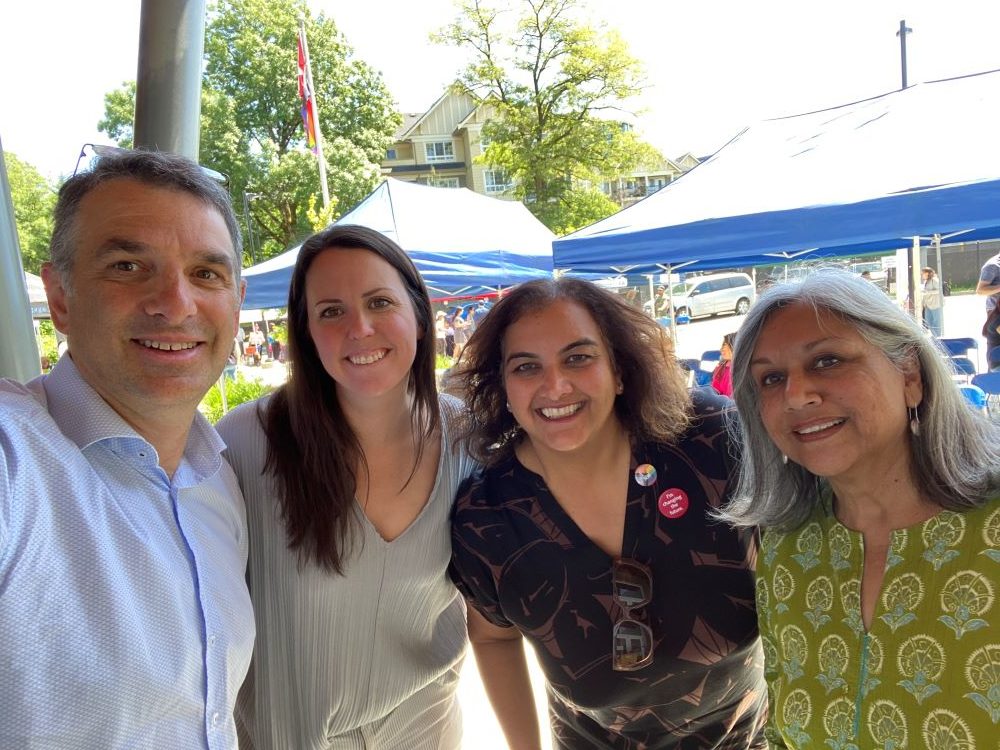




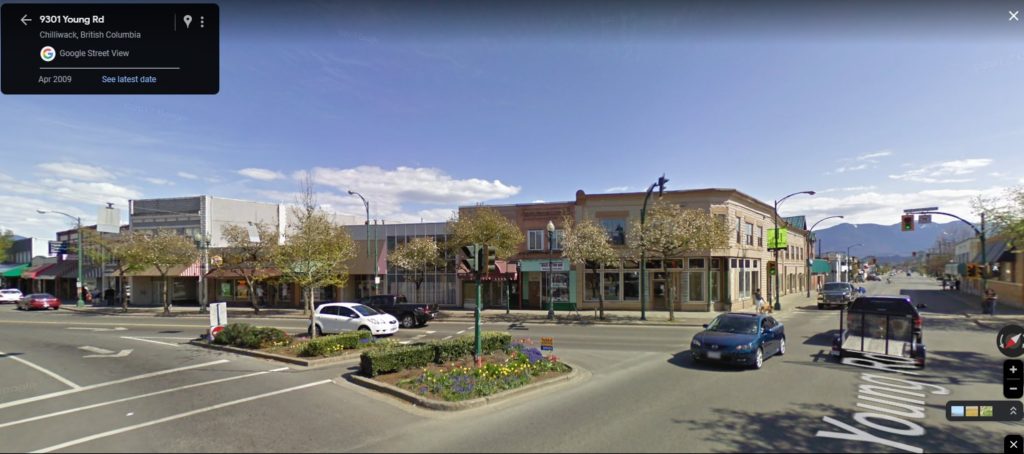

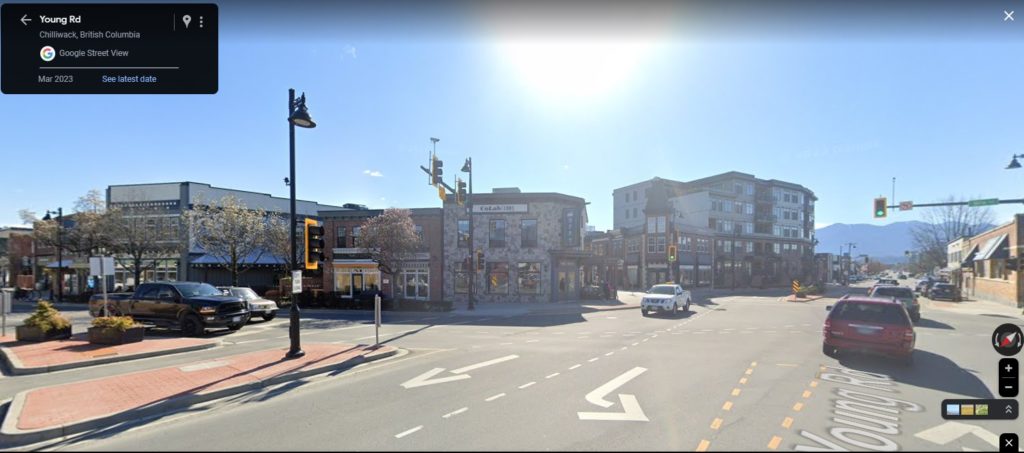
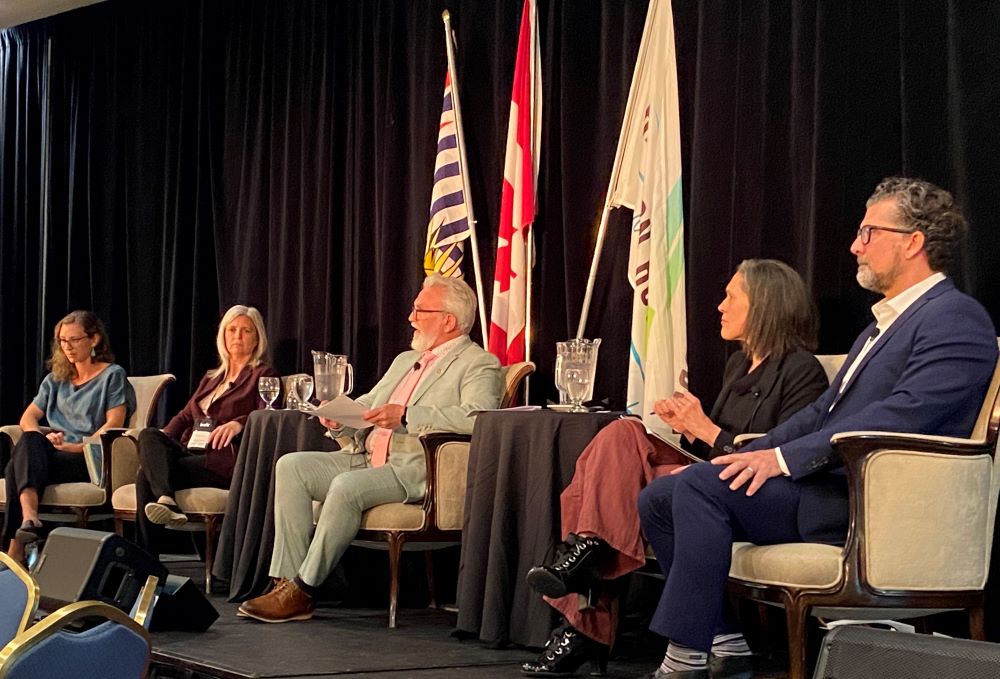
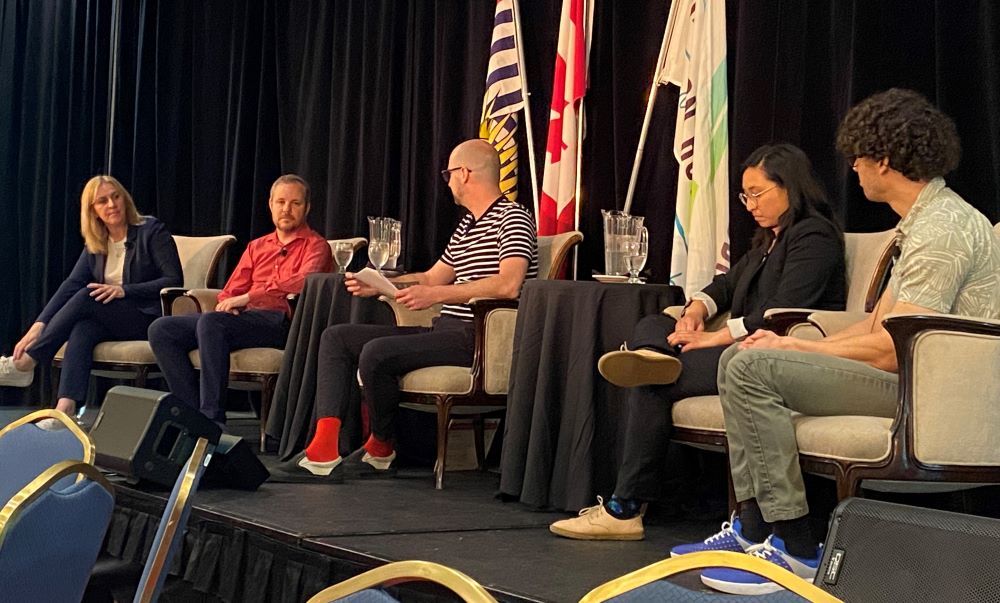
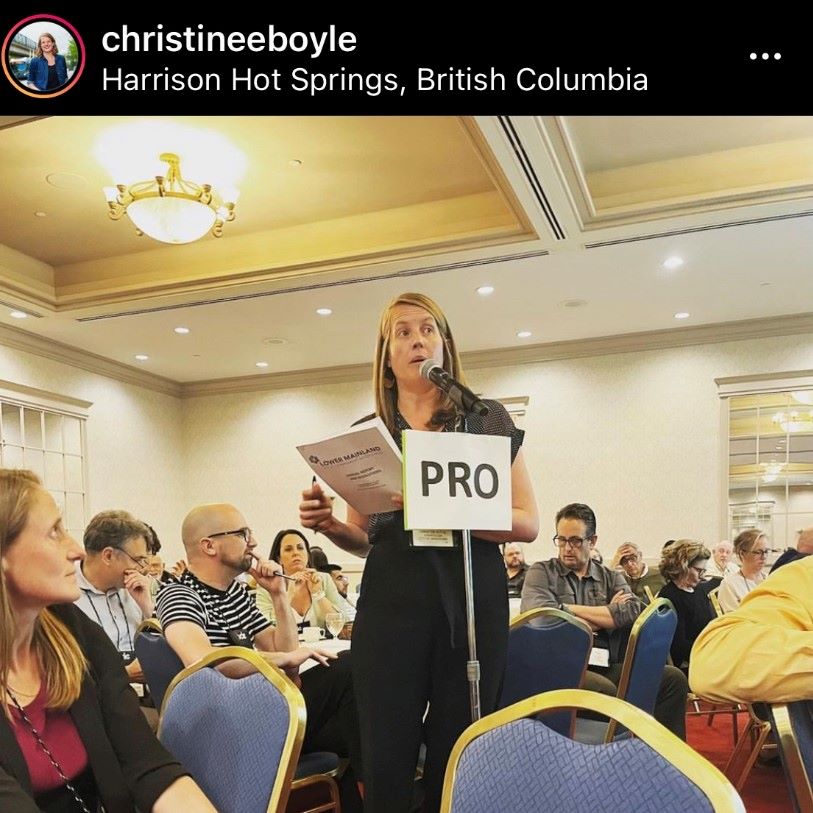
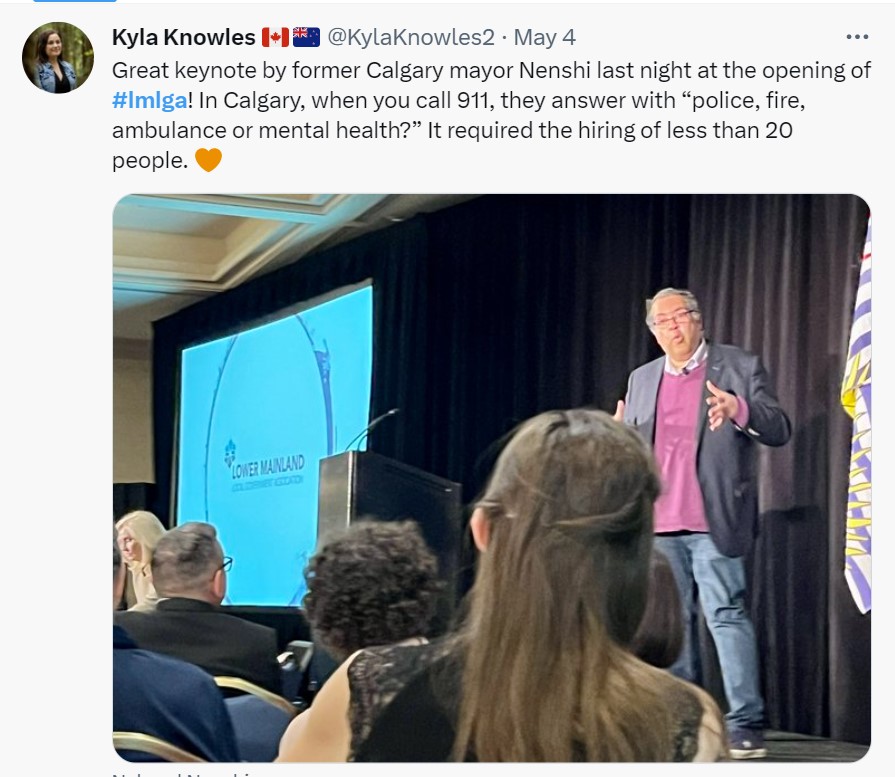
 I got to stand next to a ribbon being cut! This for the KIDS Queensborough Childcare centre, built through a partnership between the City, the Province, and Anthem Properties. This is a City-owned building that the development built as an amenity as part of their townhouse development, with funds from the City and the province to fit the spaces out.
I got to stand next to a ribbon being cut! This for the KIDS Queensborough Childcare centre, built through a partnership between the City, the Province, and Anthem Properties. This is a City-owned building that the development built as an amenity as part of their townhouse development, with funds from the City and the province to fit the spaces out. I took a quick trip over to Victoria for the Municipal Finance Authority Annual General Meeting (New Westminster is a member). While I was there I was able to set up a couple of side-meetings, including with Jason Lum, who is Chair of the Fraser Valley Regional District and an all-around great guy. We talked about Metro-FV alignment on flood preparedness, air quality, and inter-regional transportation in preparation for the Lower Mainland LGA meeting coming up in May.
I took a quick trip over to Victoria for the Municipal Finance Authority Annual General Meeting (New Westminster is a member). While I was there I was able to set up a couple of side-meetings, including with Jason Lum, who is Chair of the Fraser Valley Regional District and an all-around great guy. We talked about Metro-FV alignment on flood preparedness, air quality, and inter-regional transportation in preparation for the Lower Mainland LGA meeting coming up in May. I also went out to the Fraser Valley to join Metro Vancouver senior staff and Board Members for a two-day Strategic Planning session that was informative and at times challenging, with the massive scale of infrastructure work Metro needs to do in coming years.
I also went out to the Fraser Valley to join Metro Vancouver senior staff and Board Members for a two-day Strategic Planning session that was informative and at times challenging, with the massive scale of infrastructure work Metro needs to do in coming years. New Westminster hosted (for the first time!) the
New Westminster hosted (for the first time!) the  Vaisakhi was on April 14th, and the good folks at the Gurdwara Sahib Sukh Sagar wanted to “share the harvest” and thank City staff for their work thought the pandemic, and offered a free lunch to crews at the City’s Works Yard. The food was delicious, and we lucked out with a sunny day that made for a great picnic for staff. This was a really generous offer by the folks at the Gurdwara, and it was great to be able to break bread with the outdoor crews in such a casual setting.
Vaisakhi was on April 14th, and the good folks at the Gurdwara Sahib Sukh Sagar wanted to “share the harvest” and thank City staff for their work thought the pandemic, and offered a free lunch to crews at the City’s Works Yard. The food was delicious, and we lucked out with a sunny day that made for a great picnic for staff. This was a really generous offer by the folks at the Gurdwara, and it was great to be able to break bread with the outdoor crews in such a casual setting. The Local HUB Cycling chapter invited me to their monthly meeting to talk about what the City is doing for active transportation, and to let me know what they see as the big priorities in the year ahead.
The Local HUB Cycling chapter invited me to their monthly meeting to talk about what the City is doing for active transportation, and to let me know what they see as the big priorities in the year ahead. Like many Local Government folks around the region, I attended the UBCM Housing Conference in Vancouver. I don’t remember there ever being an event like this, with so many elected folks and planning staff from local governments, provincial government representatives (including the leaders of all three Provincial parties) and housing providers in the same room, talking about the need for different and more aggressive approaches to getting housing approved and built. The panels were great learning, but the networking and connections were the most valuable part, especially for the new members of Council.
Like many Local Government folks around the region, I attended the UBCM Housing Conference in Vancouver. I don’t remember there ever being an event like this, with so many elected folks and planning staff from local governments, provincial government representatives (including the leaders of all three Provincial parties) and housing providers in the same room, talking about the need for different and more aggressive approaches to getting housing approved and built. The panels were great learning, but the networking and connections were the most valuable part, especially for the new members of Council. One of the Conference days, I slipped out for an hour to run across the street and see the
One of the Conference days, I slipped out for an hour to run across the street and see the  I also dropped by the opening of the
I also dropped by the opening of the  A few members of Council attended the Fraser River Discovery Centre Hall of Fame induction of SRY and SeaSpan. It was great to meet more of the people who work on the river, and bend the ears of the Port and marine carriers about our common interests.
A few members of Council attended the Fraser River Discovery Centre Hall of Fame induction of SRY and SeaSpan. It was great to meet more of the people who work on the river, and bend the ears of the Port and marine carriers about our common interests. And finally, Earth Day came and went, which brought a lot of activities to the City. I joined the Family Bike Ride organized by a couple of local “Rad Moms” and Babies for Climate Action with some support for the local HUB chapter. A few folks there were unsarcastcially thankful of City of New West for building safer bike infrastructure, though they do still need work to do to make the network complete.
And finally, Earth Day came and went, which brought a lot of activities to the City. I joined the Family Bike Ride organized by a couple of local “Rad Moms” and Babies for Climate Action with some support for the local HUB chapter. A few folks there were unsarcastcially thankful of City of New West for building safer bike infrastructure, though they do still need work to do to make the network complete.